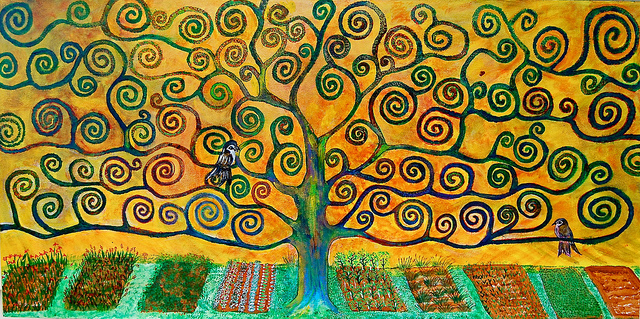Anthology Poet Highlight 35/82: Michael Hicks, “Family Tree“
[audio:http://fireinthepasture.org/wp-content/uploads/2011/12/Hicks_Family-Tree.mp3]
(My reading of “Family Tree”)
In “Family Tree,” Michael’s lines are achingly sparse, haiku-like, even. I find in them a seductive grace and restraint that at once fills me and leaves me wanting. Take, for example, his first section, “Adam” (quoted above).
As I read it, the sibilance in the first four lines does several things:
1) It mirrors the layered “hiss” of “branches” and leaves in the “wind,” which wind could stand in for the presence of God.
2) It also mimics the serpent’s hiss and the rasp of its scales, which are like “green tongues” speaking to Adam from the knowledge tree.
3) It contracts the tongue and the palate and pulls the lips against the teeth. When combined with so few open vowels—as I sound it, only the /a/ in “branches” really feels open—this sibilance creates an empathetic engagement with the serpent’s tongue. By this I mean it gives readers an experience with the serpent’s (Satan’s) way of speaking: contracted, meaning Satan holds back some portion of the truth in order to manipulate and deceive others; tight-lipped, implying that he is secretive and bitter; split-tongued, which suggests he has a duplicitous, sophistic personality.
This closed way of speaking also contributes to the closed nature of the speaker’s understanding: he hears a “secret” repeatedly whispered, but he’s kept out of the loop. He can no more “peel open” this secret than the long /o/ in “open” (the section’s only other open vowel) allows him to really open his vocal apparatus—for a split second, for a passing glimpse behind the secret’s veil—before the word closes on him and the sentence and the section come to a full stop. As contractive as is this sibilant network of words, it’s also very seductive, teasing me with a sense that there’s more to these lines, to these images, that their ultimate secret remains forever open to the reader’s interpretive imagination—at least open within the limited system of the poem’s language and its interrelations with other texts—and thus forever closed to a definitive understanding.
And for the moment, that’s where I’ll leave my reading of “Family Tree”: open. Like the “sea” and the religious canon Moses “split like a log,” carving space through which successive dispensations could journey toward a deeper relationship with one another and with God. Like Elijah’s mouth, once filled with berries by ravens, later a foreboding harbinger of the unmatched power of God. Like the splinter wounds in Christ’s flesh, marks mirrored in the true disciples tongue as s/he praises Christ’s passion and sacrifice, which absorbed universal violence and provided means for the establishment of lasting peace, in this life and beyond. Like Joseph Smith’s vision, which set flame to traditional Christianity and, with the ashes, provided fertile ground for the growth of a more sweeping and progressive vision of God, humanity, and our development through eternity.

